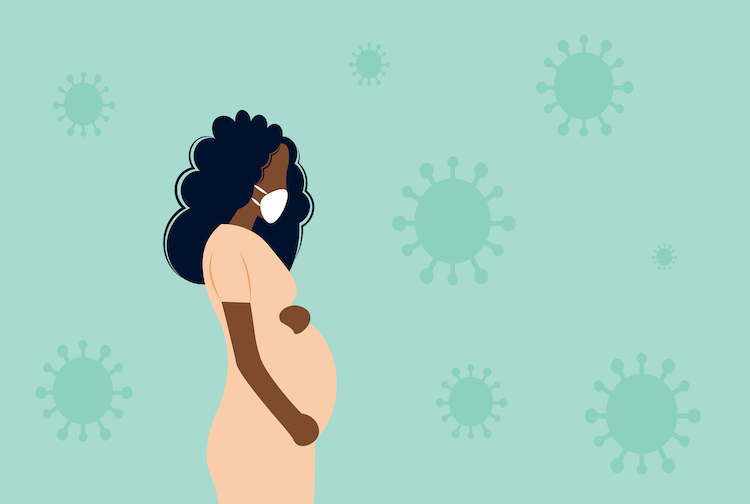
Long COVID and pregnancy in a post-pandemic world
As experts are still learning about long COVID, VCU Health providers share insights on this new condition and continued COVID-19 concerns for growing families.
June 29, 2023 Since so many changes are happening within the body when a person is pregnant, pregnancy makes an individual more susceptible to catching respiratory viruses. (Getty Images)
Since so many changes are happening within the body when a person is pregnant, pregnancy makes an individual more susceptible to catching respiratory viruses. (Getty Images)
By Jayla Parker
Pregnancy causes many changes to a person’s body, and it can also make it easier for an individual to get sick with respiratory viruses.
Over the course of the pandemic, VCU Health’s Obstetrics and Gynecology Department has been sharing the latest information about COVID-19 and vaccinations with expecting mothers and growing families. Providers are also paying close attention to the lingering effects of COVID-19, known as long COVID, which studies show can be experienced for weeks, months and even years after an initial infection.
VCU Health News spoke with OB-GYN, Amanda Ritter, M.D., to learn more about the lingering effects of COVID-19 and long COVID on pregnant individuals.
Can pregnancy increase the risk of COVID-19 and/or long COVID?
Since so many changes are occurring within the body during pregnancy, pregnancy can make catching any respiratory virus easier.
We've known since the beginning of the pandemic that pregnant individuals have an increased risk of developing severe disease, but once the COVID-19 vaccine became available, we had a significant decline in how sick pregnant individuals were getting.
Studies are continuing to take place to understand the impact of long COVID specifically on pregnant individuals. Once an expecting mother has experienced symptoms of COVID-19 for over a month, they may be diagnosed with long COVID.
What symptoms should expecting mothers look out for?
The tricky part about long COVID symptoms is that they can be extremely similar to general symptoms of pregnancy.
For example, mood changes are often seen as a regular symptom of pregnancy instead of immediately thinking it may be related to long COVID. There's a long list of symptoms that could encompass long COVID, including fatigue that interferes with daily life, difficulty breathing or shortness of breath, brain fog, sleep problems and stomach pain, among others.
Researchers part of a nationwide study recently identified a dozen key long COVID symptoms experienced by adult patients. Work is still being done to better understand the effects of long COVID as well as to develop targeted treatment options.
What treatment options are available?
At this time, there is no exact treatment once a patient is diagnosed with long COVID. Providers focus on managing the many symptoms that may come with it, which is referred to as a personal medical management plan.
When it comes to treating COVID-19, medications, like Paxlovid, help most when they are started early. Paxlovid is a safe, antiviral oral medication for adults who have a high risk of severe COVID-19 symptoms, and as mentioned before, all pregnant patients diagnosed with COVID-19 are automatically at high risk.
If you are pregnant and think you may have COVID-19, contact your provider as soon as possible, even if your symptoms are mild.
Can COVID-related symptoms be passed on to a newborn?
COVID-19 symptoms can be passed to newborns, but the rate is fairly low. Researchers are still trying to determine if the virus is being transmitted from the uterus via the placenta or if that transmission is occurring around the time of labor and delivery or after delivery.
The highest risk for transmission is for preterm infants or for infants whose mother is diagnosed with COVID-19 within 14 days of delivery.
Since long COVID is ultimately a lingering effect of the COVID-19 infection, it is not transmissible.
Can COVID-19 pass from a mother to a newborn through breastfeeding?
For breastfeeding moms, we still recommend continuing to breastfeed when they have or have had COVID-19. It’s ultimately up to the mom, but COVID-19 has not passed through breast milk or caused infection in the baby.
Although COVID-19 is not transmittable through breast milk, it is still a respiratory infection. Providers recommend that mothers who may be feeling COVID-19 symptoms take standard precautions like wearing a mask when breast feeding and washing their hands before touching their baby or breast pump.
Recent studies have shown that breast milk actually helps protect babies from infections of the ears, lungs and digestive system. For those reasons, when taking standard precautions, COVID-19 should not stop any mother from giving their baby breast milk.
How can parents best protect their infants from COVID-19 and potential long COVID symptoms?
The best way to keep both you and your baby safe from being infected by COVID-19 and experiencing long COVID symptoms is to get vaccinated, even when pregnant, and stay up to date with boosters.
Research has shown that getting a vaccine during pregnancy can help you and your newborn. When you get vaccinated, the antibodies made by your body may be passed to the fetus. These antibodies may help protect your baby from the virus after birth.
Providers also recommend practicing good hygiene and staying up to date with all prenatal and postpartum care checkups.
Since patients are no longer being screened for COVID-19 when they’re admitted to VCU Health’s labor and delivery department (unless showing severe symptoms) and an official test for long COVID does not yet exist, it’s also important for pregnant individuals to be transparent with their OB-GYNs and healthcare providers. They may be able to diagnose a person with long COVID based on health history, clinical judgment, and exclusion of other illnesses that could present with similar symptoms.



